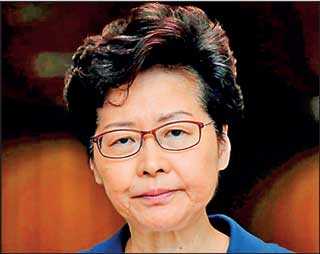Friday Feb 20, 2026
Friday Feb 20, 2026
Wednesday, 9 October 2019 00:00 - - {{hitsCtrl.values.hits}}
HONG KONG (Reuters): Hong Kong’s embattled leader Carrie Lam said on Tuesday the government had no plans at present to use colonial-era emergency powers to introduce more new laws, after a long weekend of violent protests saw widespread defiance of a ban on face masks.
 |
Hong Kong Chief Executive Carrie Lam speaks during a news conference in Hong Kong, China, 8 October – Reuters
|
Speaking at a weekly news conference, Lam warned that Hong Kong’s economy was suffering badly due four months of often violent protests. The Asian financial hub is facing its first recession in a decade.
Despite the regular clashes between protesters and police - and the first interaction between Chinese troops stationed in the territory and demonstrators - Lam said Hong Kong was equipped to handle the situation on its own.
On Tuesday, Hong Kong staggered back to work with its metro rail system only partially functioning due to widespread vandalism of infrastructure and commuters facing long queues at stations that were open.
Lam has introduced emergency powers for the first time in more than 50 years to outlaw face masks, which protesters have used to shield their identities, but the move has angered the demonstrators and ordinary residents of the city.
Some school students showed up for class on Tuesday after the three-day weekend wearing mouth-covering masks and about 100 students, many wearing face masks, gathered on the Hong Kong Baptist University campus to protest against recent arrests.
China’s Oct. 1 National Day holiday week is normally a time when Hong Kong is flooded with visitors, but Lam said tourist numbers plummeted and the impact on the city’s third quarter economic data from the protests would “surely be very bad”.
She appealed to property developers and landlords to offer relief to retailers whose businesses had been hit.
“For the first six days of October, during the so-called Golden Week holiday, visitors visiting Hong Kong plunged over 50%,” she said. Retail, catering, tourism and hotels had been hit hard, with some 600,000 people affected, she said.
The protests, which show no sign of abating, pose the biggest popular challenge to Chinese President Xi Jinping since he came to power in 2012 and are Hong Kong’s thorniest political crisis since Britain returned it to China in 1997.
What started as opposition to a now-withdrawn extradition bill has grown into a pro-democracy movement against what is seen as Beijing’s tightening grip on the city, which protesters say undermines a “one country, two systems” formula promised when Hong Kong returned to Chinese rule.
China dismisses such accusations, saying foreign governments, including Britain and the United States, have fanned anti-China sentiment.
US President Donald Trump said on Monday that if anything bad happened in Hong Kong it would be bad for the US-China trade talks.
And an increasing number of US lawmakers voiced anger on Monday over the National Basketball Association’s response to a Houston Rockets official’s tweet backing the protests.
Lam, who has said she serves both the central government and the people of Hong Kong, was in Beijing last week for National Day festivities but said she did not meet any central government officials to discuss “business”.
Asked under what circumstances she would call upon Beijing for help to quell the protests, Lam said Hong Kong should be able to find solutions on its own.
“I cannot tell you categorically now under what circumstances we will do extra things, including ... calling on the central government to help,” she said.